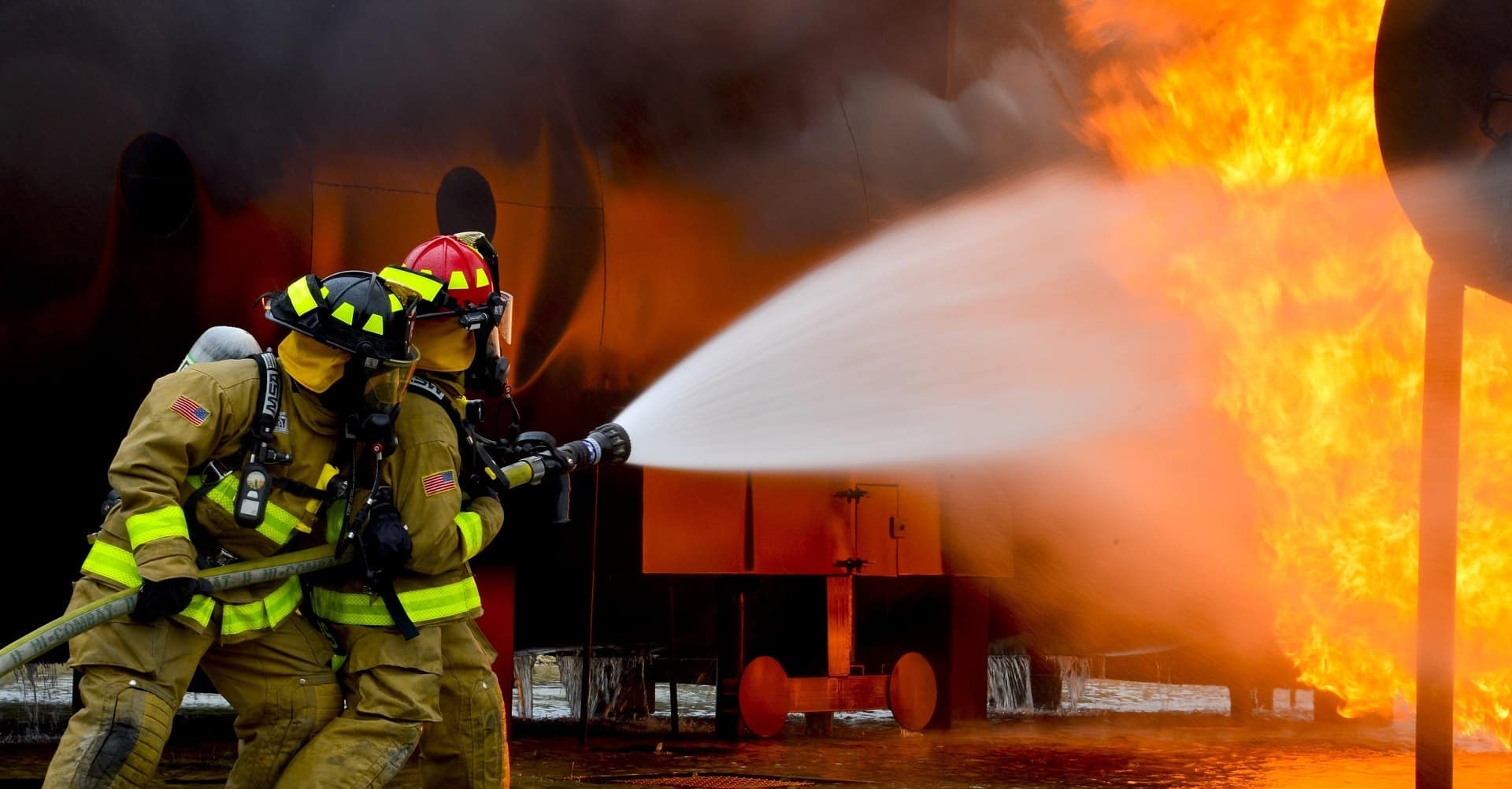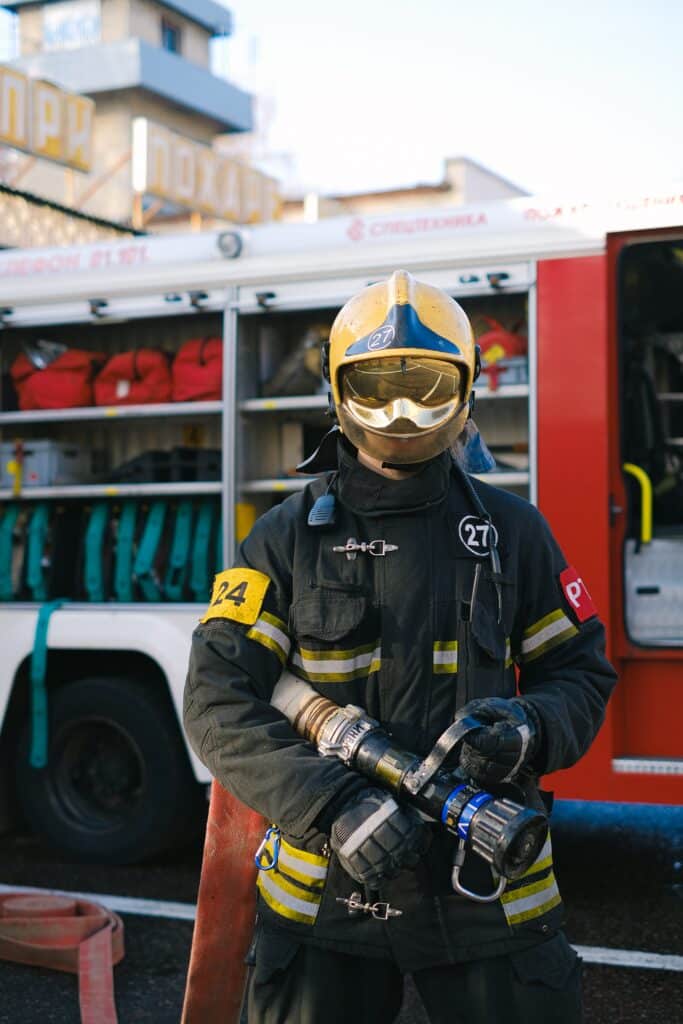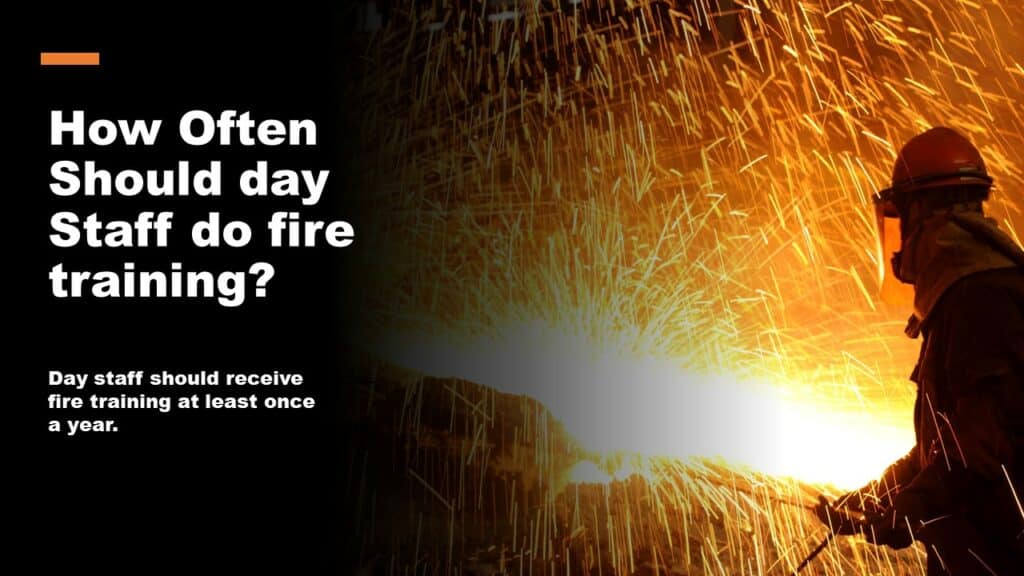How Often Do Day Staff Require Fire Training?
Estimated reading time: 8 minutes

How often do day staff require Fire Training?
Fire training is crucial for staff in all roles to ensure safe evacuation and emergency response. But how often should day staff specifically undergo refresher fire training? The frequency of fire training for day staff can vary depending on factors such as industry regulations, risk assessments, and staff turnover.
In general, it’s advisable for day staff to receive fire training at least annually to ensure they are adequately prepared to respond to fire emergencies. High-risk industries may need training every six months for staff.
Night staff typically require fire training with the same frequency as day staff, which is typically every 12 months, though it may vary depending on specific workplace requirements and risk assessments.
This article examines factors influencing frequency, legal obligations, benefits of regular training, and best practices to equip day staff with the readiness to handle fire risks.
Listen to Audio
What is Fire Training?
Fire training educates employees on fire prevention, evacuation protocols, using extinguishers, raising alarms, assistance techniques, and other emergency response skills. It combines knowledge-based teaching with practical drills.
Proper training is key as staff will be first responders in the event of a fire. Their quick, skilled actions can save lives and property. Insufficient training leaves staff unsure how to react, costing precious evacuation time.

Fire training refers to learning opportunities that provide staff with the knowledge, skills, and practical capability to effectively prevent, respond to, and manage fire emergencies in the workplace. It encompasses a broad range of learning objectives:
- Understanding fire science such as chemistry, dynamics, causes, spread prevention etc. to develop hazard awareness.
- Learning legal obligations in relation to fire safety and prevention.
- Studying evacuation procedures and protocols for different fire scenarios and building layouts.
- Practicing raising fire alarms and operating fire suppression equipment like extinguishers in simulations.
- Building skills in safety assistance techniques like lifting mobility impaired occupants during evacuation.
- Coordinating emergency response plans between departments and individuals with assigned fire duties.
- Running realistic drills to test evacuation capability and firefighting response times.
- Gaining familiarity with building fire safety features like alarm systems, escape doors, floor plans etc.
- Being trained in post-fire response like containing damage, investigation causes, reporting to authorities etc.
The goal is developing well-rounded understanding, readiness and capability to prevent fires from occurring, respond urgently and correctly if they do occur, and manage the aftermath.
Regular reinforcing of this knowledge through ongoing refresher training is key to true preparedness.
Legal Duties Regarding Fire Training
In the UK, the Regulatory Reform (Fire Safety) Order 2005 mandates that employers must provide adequate fire safety training to personnel. The frequency is not specified but should be based on workplace risk and ensure ongoing competence.
Specific regulations also require maintenance staff get training to manage fire safety measures. Other staff training should align with the emergency plan.
Upskilling due to staff turnover or changes must also occur.
Recommended Fire Training Frequency
There is no universal rule on fire training frequency for day staff. Based on common guidelines, low-risk office settings likely only require annual refresher training (every 12 months).
Higher-risk industries like care facilities may need training every 6 months .
The best schedule meets legal duties while maximizing learning retention.
Too frequent can be disruptive operationally, while too infrequent leads to decaying skills and non-compliance. Striking the right balance depends on risk levels, staff needs and operational capacity.
Protect residents, comply with regulations. Day staff online fire safety training. Start Now!
How often do day staff require Fire Training?
Day staff need fire training once a year to understand how to stay safe at work and what to do if there’s a fire.
But sometimes, day staff might need more fire drill training if:
- Kind of Work: The type of job matters. For example, hotels and care homes have more risk, so staff might need more training.
- Specific Jobs: Some jobs, like fire marshals or those using dangerous equipment, need extra training.
- Workplace Changes: If the workplace or fire rules change, more training is needed.
- Accidents or Close Calls: If there are accidents or near accidents with fires, that’s a sign more training is needed.
Employers, especially in critical fields, must check if day staff know about fire safety and give them more training if necessary.
Doing fire drills is important so everyone knows what to do when fire happens.
Again these are some helpful tips for good fire training for day staff:
- Timing: Make sure the training happens at times that are good for day staff, like during the day or in the evening.
- Short and Clear: Keep the training short and to the point because day staff might be tired.
- Different Ways to Learn: Use different ways to teach, like talking, showing, and hands-on practice, to make sure the training is interesting and useful.
- Custom Training: Talk about the specific fire risks that day staff might face.
- Keep Learning: Give day staff more training regularly to make sure they remember what to do.
How often do night staff require fire training?
Night staff typically require fire training with the same frequency as day staff, which is typically every 12 months, though it may vary depending on specific workplace requirements and risk assessments.
Factors that would determine how often a night staff should be fire trained are:
- Type of Work: Some places, like hotels and care homes, have more risks because they have guests or residents to take care of. So, their nighttime staff might need training more often.
- Job Requirements: Some jobs need more fire safety training. For example, people who are fire marshals or use dangerous equipment might need extra training.
- Changes at Work: If things change at your workplace or how you do fire safety, you might need more training.
- Past Incidents: If there were any accidents or close calls, it’s a sign that more training might be necessary.
Employers should assess the level of knowledge their night staff have about fire safety as it pertains to their work and industry. Based on their knowledge and experience, necessary fire training can then be recommended.
In addition, employers should ensure that everyone knows what to do in case of a fire by doing practice drills.
Top Read: Essential Legal Requirement For Employees On Fire Safety Within the UK.

Tailoring to Day Staff Roles
Day staff have diverse responsibilities, so training should align with their fire safety duties. Reception staff may guide evacuation while maintenance inspect extinguishers.
Cleaners keep flammable storage areas orderly. Caterers know kitchen risks. Training should suit each role. For specialised training and advice, call 01782 563333 or send a message to enquiries@caringforcare.co.uk.
Benefits of Regular Refresher Training
- Improved fire safety awareness and emergency response skills.
- Rapid, coordinated evacuation and assistance for vulnerable occupants.
- Muscle memory reinforcing the ability to act instinctively.
- Confidence handling extinguishers, alarms, and other equipment.
- Understanding updated procedures, new staff and altered building layouts.
- Compliance with legal requirements through ongoing competence.
People Also Love: Fire Workplace Hazard: Things you Should Know.
Overcoming Resistance to Training
Some staff view fire training as unnecessary if covered previously.
Gaining buy-in involves:
- Communicating the legal necessity and lifesaving purpose.
- Making content engaging through interaction and mixed teaching formats.
- Linking skills learning to staffs’ specific fire duties.
- Allowing staff to share fire safety concerns to address in training.
- Making training mandatory and sharing expectations of participation.
Effective Training Delivery Modes
Alongside traditional lectures, methods like:
- Fire drills practicing evacuations and use of equipment.
- Online learning reinforcing knowledge in bite-sized modules.
- Virtual reality simulations creating realistic emergency scenarios.
- Peer discussions assessing preparedness and identifying gaps.
- Brief refresher tutorials focusing on new information.
Can enhance engagement and integration of learnings.
People Also Read: Fire Extinguisher Demonstration – What you should learn during fire training
Case Study: Care Home Staff Refresher Training
A care home mandated fire training every 6 months for staff based on CQC guidance. E-learning reinforced knowledge between hands-on drills.
Tactics like lifting mobility impaired residents were practiced.
Within a year, evacuation times fell by 24%. 99.9% of staff display confidence using extinguishers. The training fulfills legal requirements while equipping staff to save lives.
Whether it’s for your day or night staff, our team is here to provide expert advice and tailored fire safety training. Reach out to us at enquiries@caringforcare.co.uk or call 01782 563333 to ensure the safety of your team and residents.
Best Practices for Day Staff Fire Training
- Assess roles to shape training content suiting responsibilities.
- Set training at a frequency fulfilling legal duties based on risk.
- Use blended teaching methods combining online and practical learning.
- Ensure training reach new joiners through onboarding integration.
- Test evacuation capability and response times via realistic drills.
- Refresh at least annually even in low-risk settings to boost preparedness.
- Encourage staff to implement learnings like keeping flammables away from ignition sources.
Conclusions
While legal standards do not mandate set fire training frequencies, sufficient ongoing education based on risk levels and staff duties is a must for day/night staff. An engaged, personalised approach raises participation.
Combined online and practical activities drive home learnings.
Ultimately, employers regularly reinforcing day staff and night staff readiness and capability to handle fire emergencies is crucial for safeguarding lives and property when every second counts.
Let us Help you
We’ll help you find the right course for your needs. Tell us a little bit about your situation and what you would like to achieve.
We’ll get back to you within one working day.
